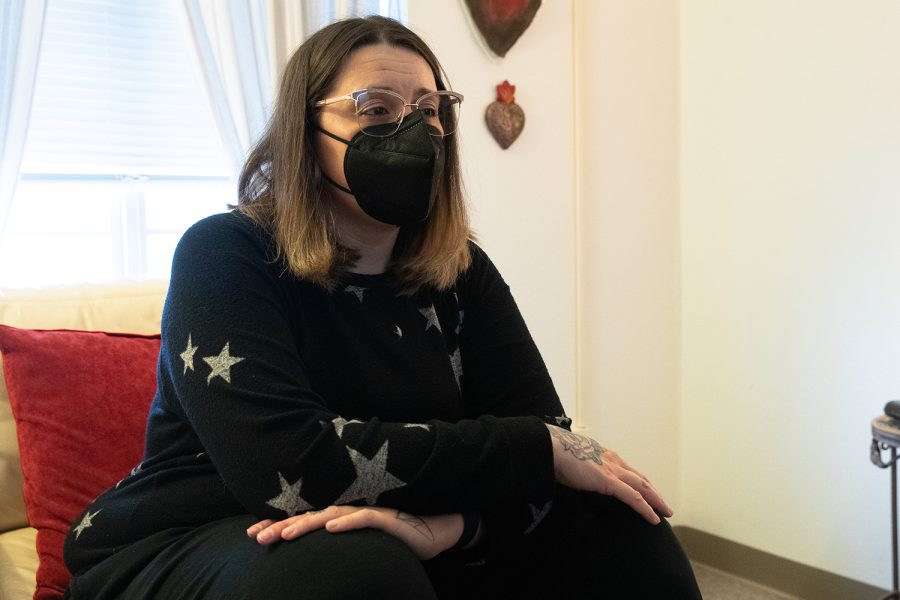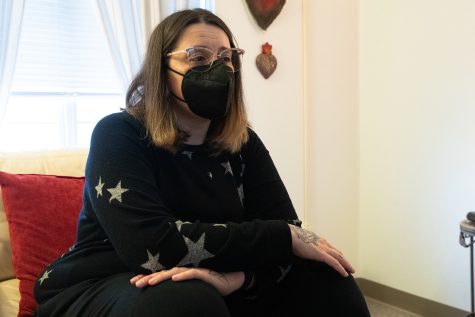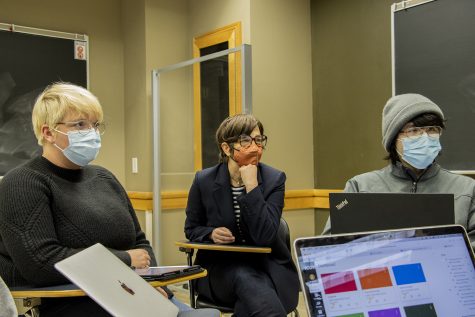‘Long COVID-19’ patients continue to struggle with chronic short breath, brain fog, other complications
Darcy Havel-Sturdevant poses for a photo on Wednesday, March 23, 2022.
Some COVID-19 patients with chronic symptoms experience difficulty multitasking and short-term memory as well as respiratory issues and even seizures. While some of them report eventual recovery, many are left without a prognosis.
“I don’t want to be disabled, but I know I’m disabled,” said Darcy Havel-Sturdevant, who contracted COVID-19 in April 2020 and still suffers long-term symptoms.
Havel-Sturdevant, an Iowa City resident and former clerk at the University of Iowa Hospitals and Clinics, said she is currently on long-term disability assistance and has been since her first COVID-19 infection in April 2020. Following her diagnosis, she had a fever for about four months.
“By the time the fever came out of it, I was left with all these cognitive difficulties that I couldn’t even drive myself to work if I wanted to,” she said. “I would have fallen asleep at the desk and not been able to drive there. It would’ve been a nightmare.”
The symptoms Havel-Sturdevant described are common among patients with chronic COVID-19, also called “long COVID,” when symptoms caused by the virus extend beyond 12 weeks after contracting it.
Alpana Garg, a clinical assistant professor of internal medicine at the UI, said she has seen over 600 long-haul patients in similar straits since June 2020.
Garg referenced a survey study in which researchers found that most patients who were previously vaccinated did not maintain their symptoms to the extent that long-haulers do. She cautioned, though, that survey studies cannot be taken as absolutes.
When Havel-Sturdevant was first infected with the virus, vaccines were not available.
In April 2020, Havel-Sturdevant received a dual diagnosis of mycoplasma pneumoniae, a type of bacterial pneumonia, and COVID-19. She said she suffered a sore throat, coughs, headaches, shortness of breath, and gastrointestinal issues.
Havel-Sturdevant said could not drive or function normally in general and was upset that she could not get social security benefits.
“I applied for social security and went all the way to the hearing,” she said. “That got denied even with substantial limitations like memory deficits that are in the second to ninth percentile — it was still denied.”
Overexerting with long COVID-19 causes brain fog, she said.
“You can’t focus; you can’t function,” she said. “You can barely get yourself off the couch.”
Havel-Sturdevant was reinfected with COVID-19 in December 2021.
“The second infection was really weird because it started off like a really bad flu — like a flu on steroids,” she said. “It was the worst headache. I had to get injections monthly because of my post-COVID problems.”
About a week-and-a-half into her second infection, Havel-Sturdevant said her symptoms became exclusively respiratory.
“It all went into my lungs,” she said.
She said her shortness of breath has slowly gotten better since her second infection, though the same is not true of her neurological issues.
Garg said the memory issues experienced by long-haulers are subtle. COVID-19 patients have trouble multitasking and often forget words, but receive average scores on cognitive tests, she said.
“Never in my life had I ever gotten a migraine,” Havel-Sturdevant said. “It’s just not me. And then I get COVID, and a month-and-a-half later after my first infection, [I get] daily debilitating migraines. Then, the memory and processing issues.”
She said the second infection caused seizures as well.
“I had an EEG done that showed seizure activity, so I just recently started medication for that,” she said.
Havel-Sturdevant began taking Alzheimer’s disease medication after completing a neuro-psych evaluation. Although she is not working, Havel-Sturdevant said she started driving again, even if that means her mother needs to accompany and supervise her, as her symptoms still have sway.
While some with long COVID-19 report recovery, Garg explained that no single treatment is yet known for the condition.
“They are symptomatic treatments, I would say,” Garg said. “What are the problems, and which are bothering them the most? I would say there is no magic pill for them that makes everything go away.”





